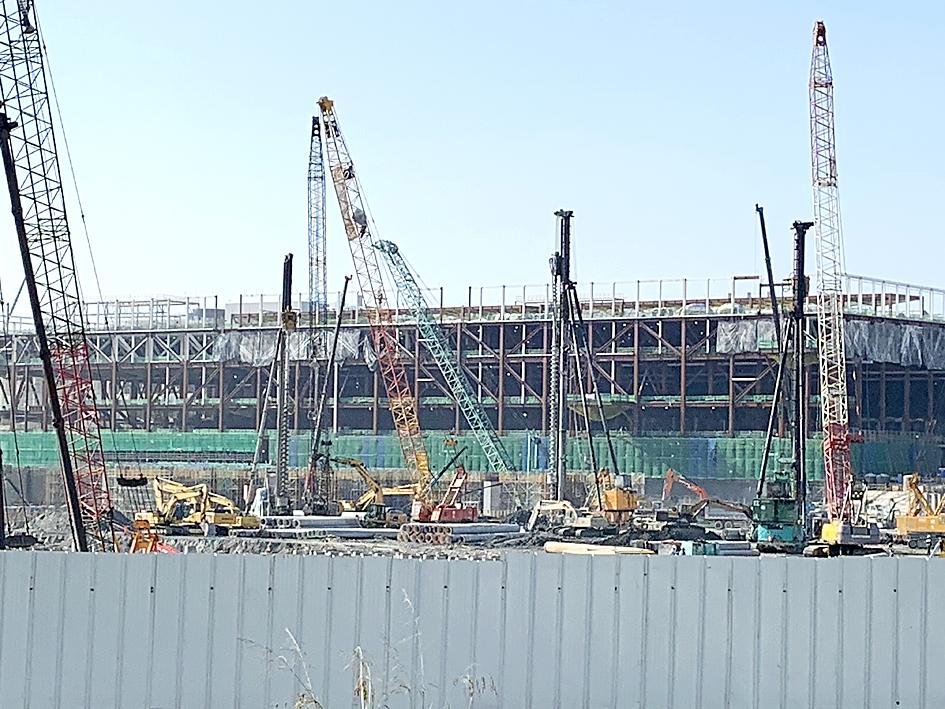Taiwan and China are to build more new high-volume semiconductor fabrication plants this year and next year than any other country, together contributing more than half of all new fabs in the world by constructing eight each, SEMI said in a quarterly report yesterday.
Global chipmakers are to start building 19 new high-volume fabs by the end of this year and another 10 next year to meet accelerating demand for chips from the communications, computing, healthcare, online services and automotive sectors, SEMI, an association that represents the global semiconductor sector, said in its quarterly report.
“Equipment spending for these 29 fabs is expected to surpass US$140 billion over the next few years, as the industry pushes to address the global chip shortage,” SEMI president and chief executive officer Ajit Manocha said.

Photo: Grace Hung, Taipei Times
“In the medium and longer term, the fab capacity expansion will help meet projected strong demand for semiconductors stemming from emerging applications such as autonomous vehicles, artificial intelligence, high-performance computing and 5G to 6G communications,” Manocha said.
China and Taiwan would lead the way with eight fabs each, followed by the Americas with six, Europe and the Middle East with three combined, and Japan and South Korea with two each, the report said.
In Taiwan, chipmakers such as Taiwan Semiconductor Manufacturing Co (TSMC, 台積電), Powerchip Semiconductor Manufacturing Co (力積電) and Vanguard International Semiconductor Corp (世界先進) are investing in new foundry fabs, SEMI said.
TSMC has raised its capital spending budget for this year to a record US$30 billion, and Vanguard, which makes driver ICs for displays and power management ICs, also boosted its capital expenditure for this year by 41 percent to NT$8.5 billion, while Powerchip in March started building a new 300mm fab with an initial investment of NT$278 million.
Chinese semiconductor firms are investing in fabs that make memory chips, foundry or auto chips, rather than advanced chips, SEMI said.
Fabs that produce 300mm wafers would account for most of the new facilities, with construction beginning on 15 fabs this year and seven others next year, SEMI said.
The remaining seven fabs planned over the two-year period would be 100mm, 150mm and 200mm facilities, it added.
The 29 fabs could produce as many as 2.6 million wafers per month in 200m equivalents, the report said.
Of the semiconductor makers beginning construction of new fabs this year, some would start installing equipment next year, but most would not do so until 2023, the report added.

To many, Tatu City on the outskirts of Nairobi looks like a success. The first city entirely built by a private company to be operational in east Africa, with about 25,000 people living and working there, it accounts for about two-thirds of all foreign investment in Kenya. Its low-tax status has attracted more than 100 businesses including Heineken, coffee brand Dormans, and the biggest call-center and cold-chain transport firms in the region. However, to some local politicians, Tatu City has looked more like a target for extortion. A parade of governors have demanded land worth millions of dollars in exchange

Hong Kong authorities ramped up sales of the local dollar as the greenback’s slide threatened the foreign-exchange peg. The Hong Kong Monetary Authority (HKMA) sold a record HK$60.5 billion (US$7.8 billion) of the city’s currency, according to an alert sent on its Bloomberg page yesterday in Asia, after it tested the upper end of its trading band. That added to the HK$56.1 billion of sales versus the greenback since Friday. The rapid intervention signals efforts from the city’s authorities to limit the local currency’s moves within its HK$7.75 to HK$7.85 per US dollar trading band. Heavy sales of the local dollar by

Taiwan Semiconductor Manufacturing Co’s (TSMC, 台積電) revenue jumped 48 percent last month, underscoring how electronics firms scrambled to acquire essential components before global tariffs took effect. The main chipmaker for Apple Inc and Nvidia Corp reported monthly sales of NT$349.6 billion (US$11.6 billion). That compares with the average analysts’ estimate for a 38 percent rise in second-quarter revenue. US President Donald Trump’s trade war is prompting economists to retool GDP forecasts worldwide, casting doubt over the outlook for everything from iPhone demand to computing and datacenter construction. However, TSMC — a barometer for global tech spending given its central role in the

An Indonesian animated movie is smashing regional box office records and could be set for wider success as it prepares to open beyond the Southeast Asian archipelago’s silver screens. Jumbo — a film based on the adventures of main character, Don, a large orphaned Indonesian boy facing bullying at school — last month became the highest-grossing Southeast Asian animated film, raking in more than US$8 million. Released at the end of March to coincide with the Eid holidays after the Islamic fasting month of Ramadan, the movie has hit 8 million ticket sales, the third-highest in Indonesian cinema history, Film